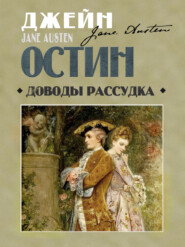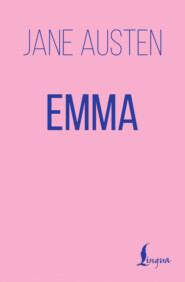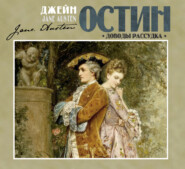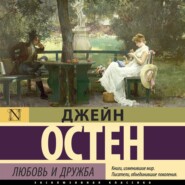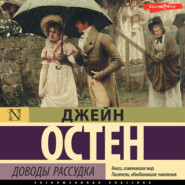По всем вопросам обращайтесь на: info@litportal.ru
(©) 2003-2024.
✖
Гордость и предубеждение / Pride and Prejudice
Настройки чтения
Размер шрифта
Высота строк
Поля
Mrs. Bennet treasured up the hint, and trusted that she might soon have two daughters married; and the man whom she could not bear to speak of the day before was now high in her good graces.
Lydia’s intention of walking to Meryton was not forgotten; every sister except Mary agreed to go with her; and Mr. Collins was to attend them, at the request of Mr. Bennet, who was most anxious to get rid of him, and have his library to himself; for thither Mr. Collins had followed him after breakfast; and there he would continue, nominally engaged with one of the largest folios in the collection, but really talking to Mr. Bennet, with little cessation, of his house and garden at Hunsford. Such doings discomposed Mr. Bennet exceedingly. In his library he had been always sure of leisure and tranquillity; and though prepared, as he told Elizabeth, to meet with folly and conceit in every other room of the house, he was used to be free from them there; his civility, therefore, was most prompt in inviting Mr. Collins to join his daughters in their walk; and Mr. Collins, being in fact much better fitted for a walker than a reader, was extremely pleased to close his large book, and go.
In pompous nothings on his side, and civil assents on that of his cousins, their time passed till they entered Meryton. The attention of the younger ones was then no longer to be gained by him. Their eyes were immediately wandering up in the street in quest of the officers, and nothing less than a very smart bonnet indeed, or a really new muslin in a shop window, could recall them.
But the attention of every lady was soon caught by a young man, whom they had never seen before, of most gentlemanlike appearance, walking with another officer on the other side of the way. The officer was the very Mr. Denny, concerning whose return from London Lydia came to inquire, and he bowed as they passed. All were struck with the stranger’s air, all wondered who he could be; and Kitty and Lydia, determined if possible to find out, led the way across the street, under pretense of wanting something in an opposite shop, and fortunately had just gained the pavement when the two gentlemen, turning back, had reached the same spot. Mr. Denny addressed them directly, and entreated permission to introduce his friend, Mr. Wickham, who had returned with him the day before from town, and he was happy to say had accepted a commission in their corps. This was exactly as it should be; for the young man wanted only regimentals to make him completely charming. His appearance was greatly in his favour; he had all the best part of beauty, a fine countenance, a good figure, and very pleasing address. The introduction was followed up on his side by a happy readiness of conversation – a readiness at the same time perfectly correct and unassuming; and the whole party were still standing and talking together very agreeably, when the sound of horses drew their notice, and Darcy and Bingley were seen riding down the street. On distinguishing the ladies of the group, the two gentlemen came directly towards them, and began the usual civilities. Bingley was the principal spokesman, and Miss Bennet the principal object. He was then, he said, on his way to Longbourn on purpose to inquire after her. Mr. Darcy corroborated it with a bow, and was beginning to determine not to fix his eyes on Elizabeth, when they were suddenly arrested by the sight of the stranger, and Elizabeth happening to see the countenance of both as they looked at each other, was all astonishment at the effect of the meeting. Both changed colour, one looked white, the other red. Mr. Wickham, after a few moments, touched his hat – a salutation which Mr. Darcy just deigned to return. What could be the meaning of it? It was impossible to imagine; it was impossible not to long to know.
In another minute, Mr. Bingley, but without seeming to have noticed what passed, took leave and rode on with his friend.
Mr. Denny and Mr. Wickham walked with the young ladies to the door of Mr. Phillip’s house, and then made their bows, in spite of Miss Lydia’s pressing entreaties that they should come in, and even in spite of Mrs. Phillips’s throwing up the parlour window and loudly seconding the invitation.
Mrs. Phillips was always glad to see her nieces; and the two eldest, from their recent absence, were particularly welcome, and she was eagerly expressing her surprise at their sudden return home, which, as their own carriage had not fetched them, she should have known nothing about, if she had not happened to see Mr. Jones’s shop boy in the street, who had told her that they were not to send any more draughts to Netherfield because the Miss Bennets were come away, when her civility was claimed towards Mr. Collins by Jane’s introduction of him. She received him with her very best politeness, which he returned with as much more, apologising for his intrusion, without any previous acquaintance with her, which he could not help flattering himself, however, might be justified by his relationship to the young ladies who introduced him to her notice. Mrs. Phillips was quite awed by such an excess of good breeding; but her contemplation of one stranger was soon put to an end by exclamations and inquiries about the other, of whom, however, she could only tell her nieces what they already knew, that Mr. Denny had brought him from London, and that he was to have a lieutenant’s commission in the – shire. She had been watching him the last hour, she said, as he walked up and down the street, and had Mr. Wickham appeared, Kitty and Lydia would certainly have continued the occupation, but unluckily no one passed windows now except a few of the officers, who, in comparison with the stranger, were become “stupid, disagreeable fellows.” Some of them were to dine with the Phillipses the next day, and their aunt promised to make her husband call on Mr. Wickham, and give him an invitation also, if the family from Longbourn would come in the evening. This was agreed to, and Mrs. Phillips protested that they would have a nice comfortable noisy game of lottery tickets, and a little bit of hot supper afterwards. The prospect of such delights was very cheering, and they parted in mutual good spirits. Mr. Collins repeated his apologies in quitting the room, and was assured with unwearying civility that they were perfectly needless.
As they walked home, Elizabeth related to Jane what she had seen pass between the two gentlemen; but though Jane would have defended either or both, had they appeared to be in the wrong, she could no more explain such behaviour than her sister.
Mr. Collins on his return highly gratified Mrs. Bennet by admiring Mrs. Phillips’s manners and politeness. He protested that, except Lady Catherine and her daughter, he had never seen a more elegant woman; for she had not only received him with the utmost civility, but even pointedly included him in her invitation for the next evening, although utterly unknown to her before. Something, he supposed, might be attributed to his connection with them, but yet he had never met with so much attention in the whole course of his life.
Chapter 16
As no objection was made to the young people’s engagement with their aunt, and all Mr. Collins’s scruples of leaving Mr. and Mrs. Bennet for a single evening during his visit were most steadily resisted, the coach conveyed him and his five cousins at a suitable hour to Meryton; and the girls had the pleasure of hearing, as they entered the drawing room, that Mr. Wickham had accepted their uncle’s invitation, and was then in the house.
When this information was given, and they had all taken their seats, Mr. Collins was at leisure to look around him and admire, and he was so much struck with the size and furniture of the apartment, that he declared he might almost have supposed himself in the small summer breakfast parlour at Rosings; a comparison that did not at first convey much gratification; but when Mrs. Phillips understood from him what Rosings was, and who was its proprietor; when she had listened to the description of only one of Lady Catherine’s drawing rooms, and found that the chimney-piece alone had cost eight hundred pounds, she felt all the force of the compliment, and would hardly have resented a comparison with the housekeeper’s room.
In describing to her all the grandeur of Lady Catherine and her mansion, with occasional digressions in praise of his own humble abode, and the improvements it was receiving, he was happily employed until the gentlemen joined them; and he found in Mrs. Phillips a very attentive listener, whose opinion of his consequence increased with what she heard, and who was resolving to retail it all among her neighbours as soon as she could. To the girls, who could not listen to their cousin, and who had nothing to do but to wish for an instrument, and examine their own indifferent imitations of china on the mantelpiece, the interval of waiting appeared very long. It was over at last, however. The gentlemen did approach, and when Mr. Wickham walked into the room, Elizabeth felt that she had neither been seeing him before, nor thinking of him since, with the smallest degree of unreasonable admiration. The officers of the – shire were in general a very creditable, gentlemanlike set, and the best of them were of the present party; but Mr. Wickham was as far beyond them all in person, countenance, air, and walk, as they were superior to the broad-faced, stuffy uncle Phillips, breathing port wine, who followed them into the room.
Mr. Wickham was the happy man towards whom almost every female eye was turned, and Elizabeth was the happy woman by whom he finally seated himself; and the agreeable manner in which he immediately fell into conversation, though it was only on its being a wet night, made her feel that the commonest, dullest, most threadbare topic might be rendered interesting by the skill of the speaker.
The officers of the – shire
With such rivals for the notice of the fair, as Mr. Wickham and the officers, Mr. Collins seemed to sink into insignificance; to the young ladies he certainly was nothing; but he had still at intervals a kind listener in Mrs. Phillips, and was, by her watchfulness, most abundantly supplied with coffee and muffin. When the card-tables were placed, he had the opportunity of obliging her in turn, by sitting down to whist.
“I know little of the game at present,” said he, “but I shall be glad to improve myself, for in my situation in life—” Mrs. Phillips was very glad for his compliance, but could not wait for his reason.
Mr. Wickham did not play at whist, and with ready delight was he received at the other table between Elizabeth and Lydia. At first there seemed danger of Lydia’s engrossing him entirely, for she was a most determined talker; but being likewise extremely fond of lottery tickets, she soon grew too much interested in the game, too eager in making bets and exclaiming after prizes to have attention for anyone in particular. Allowing for the common demands of the game, Mr. Wickham was therefore at leisure to talk to Elizabeth, and she was very willing to hear him, though what she chiefly wished to hear she could not hope to be told – the history of his acquaintance with Mr. Darcy. She dared not even mention that gentleman. Her curiosity, however, was unexpectedly relieved. Mr. Wickham began the subject himself. He inquired how far Netherfield was from Meryton; and, after receiving her answer, asked in a hesitating manner how long Mr. Darcy had been staying there.
“About a month,” said Elizabeth; and then, unwilling to let the subject drop, added, “He is a man of very large property in Derbyshire, I understand.”
“Yes,” replied Mr. Wickham; “his estate there is a noble one. A clear ten thousand per annum. You could not have met with a person more capable of giving you certain information on that head than myself, for I have been connected with his family in a particular manner from my infancy.”
Elizabeth could not but look surprised.
“You may well be surprised, Miss Bennet, at such an assertion, after seeing, as you probably might, the very cold manner of our meeting yesterday. Are you much acquainted with Mr. Darcy?”
“As much as I ever wish to be,” cried Elizabeth very warmly. “I have spent four days in the same house with him, and I think him very disagreeable.”
“I have no right to give my opinion,” said Wickham, “as to his being agreeable or otherwise. I am not qualified to form one. I have known him too long and too well to be a fair judge. It is impossible for me to be impartial. But I believe your opinion of him would in general astonish – and perhaps you would not express it quite so strongly anywhere else. Here you are in your own family.”
“Upon my word, I say no more here than I might say in any house in the neighbourhood, except Netherfield. He is not at all liked in Hertfordshire. Everybody is disgusted with his pride. You will not find him more favourably spoken of by anyone.”
“I cannot pretend to be sorry,” said Wickham, after a short interruption, “that he or that any man should not be estimated beyond their deserts; but with him I believe it does not often happen. The world is blinded by his fortune and consequence, or frightened by his high and imposing manners, and sees him only as he chooses to be seen.”
“I should take him, even on my slight acquaintance, to be an ill-tempered man.” Wickham only shook his head.
“I wonder,” said he, at the next opportunity of speaking, “whether he is likely to be in this country much longer.”
“I do not at all know; but I heard nothing of his going away when I was at Netherfield. I hope your plans in favour of the – shire will not be affected by his being in the neighbourhood.”
“Oh! no – it is not for me to be driven away by Mr. Darcy. If he wishes to avoid seeing me, he must go. We are not on friendly terms, and it always gives me pain to meet him, but I have no reason for avoiding him but what I might proclaim before all the world; a sense of very great ill usage, and most painful regrets at his being what he is. His father, Miss Bennet, the late Mr. Darcy, was one of the best men that ever breathed, and the truest friend I ever had; and I can never be in company with this Mr. Darcy without being grieved to the soul by a thousand tender recollections. His behaviour to myself has been scandalous; but I verily believe I could forgive him anything and everything, rather than his disappointing the hopes and disgracing the memory of his father.”
Elizabeth found the interest of the subject increase, and listened with all her heart; but the delicacy of it prevented further inquiry.
Mr. Wickham began to speak on more general topics, Meryton, the neighbourhood, the society, appearing highly pleased with all that he had yet seen, and speaking of the latter especially, with gentle but very intelligible gallantry.
“It was the prospect of constant society, and good society,” he added, “which was my chief inducement to enter the – shire. I knew it to be a most respectable, agreeable corps, and my friend Denny tempted me further by his account of their present quarters, and the very great attentions and excellent acquaintances Meryton had procured them. Society, I own, is necessary to me. I have been a disappointed man, and my spirits will not bear solitude. I must have employment and society. A military life is not what I was intended for, but circumstances have now made it eligible. The church ought to have been my profession – I was brought up for the church, and I should at this time have been in possession of a most valuable living, had it pleased the gentleman we were speaking of just now.”
“Indeed!”
“Yes – the late Mr. Darcy bequeathed me the next presentation of the best living in his gift. He was my godfather, and excessively attached to me. I cannot do justice to his kindness. He meant to provide for me amply, and thought he had done it; but when the living fell, it was given elsewhere.”
“Good heavens!” cried Elizabeth; “but how could that be? How could his will be disregarded? Why did you not seek legal redress?”
“There was just such an informality in the terms of the bequest as to give me no hope from law. A man of honour could not have doubted the intention, but Mr. Darcy chose to doubt it – or to treat it as a merely conditional recommendation, and to assert that I had forfeited all claim to it by extravagance, imprudence – in short anything or nothing. Certain it is, that the living became vacant two years ago, exactly as I was of an age to hold it, and that it was given to another man; and no less certain is it, that I cannot accuse myself of having really done anything to deserve to lose it. I have a warm, unguarded temper, and I may have spoken my opinion of him, and to him, too freely. I can recall nothing worse. But the fact is, that we are very different sort of men, and that he hates me.”
“This is quite shocking! He deserves to be publicly disgraced.”
“Some time or other he will be – but it shall not be by me. Till I can forget his father, I can never defy or expose him.”
Elizabeth honoured him for such feelings, and thought him handsomer than ever as he expressed them.
“But what,” said she, after a pause, “can have been his motive? What can have induced him to behave so cruelly?”
“A thorough, determined dislike of me – a dislike which I cannot but attribute in some measure to jealousy. Had the late Mr. Darcy liked me less, his son might have borne with me better; but his father’s uncommon attachment to me irritated him, I believe, very early in life. He had not a temper to bear the sort of competition in which we stood – the sort of preference which was often given me.”
“I had not thought Mr. Darcy so bad as this – though I have never liked him. I had not thought so very ill of him. I had supposed him to be despising his fellow-creatures in general, but did not suspect him of descending to such malicious revenge, such injustice, such inhumanity as this!”
After a few minutes’ reflection, however, she continued, “I do remember his boasting one day, at Netherfield, of the implacability of his resentments, of his having an unforgiving temper. His disposition must be dreadful.”
“I will not trust myself on the subject,” replied Wickham; “I can hardly be just to him.”
Elizabeth was again deep in thought, and after a time exclaimed, “To treat in such a manner the godson, the friend, the favourite of his father!” She could have added, “A young man, too, like you, whose very countenance may vouch for your being amiable” – but she contented herself with, “and one, too, who had probably been his companion from childhood, connected together, as I think you said, in the closest manner!”
“We were born in the same parish, within the same park, the greatest part of our youth was passed together; inmates of the same house, sharing the same amusements, objects of the same parental care. My father began life in the profession which your uncle, Mr. Phillips, appears to do so much credit to – but he gave up everything to be of use to the late Mr. Darcy and devoted all his time to the care of the Pemberley property. He was most highly esteemed by Mr. Darcy, a most intimate, confidential friend. Mr. Darcy often acknowledged himself to be under the greatest obligations to my father’s active superintendence, and when, immediately before my father’s death, Mr. Darcy gave him a voluntary promise of providing for me, I am convinced that he felt it to be as much a debt of gratitude to him, as of his affection to myself.”
“How strange!” cried Elizabeth. “How abominable! I wonder that the very pride of this Mr. Darcy has not made him just to you! If from no better motive, that he should not have been too proud to be dishonest – for dishonesty I must call it.”
“It is wonderful,” replied Wickham, “for almost all his actions may be traced to pride; and pride had often been his best friend. It has connected him nearer with virtue than with any other feeling. But we are none of us consistent, and in his behaviour to me there were stronger impulses even than pride.”
“Can such abominable pride as his have ever done him good?”
Lydia’s intention of walking to Meryton was not forgotten; every sister except Mary agreed to go with her; and Mr. Collins was to attend them, at the request of Mr. Bennet, who was most anxious to get rid of him, and have his library to himself; for thither Mr. Collins had followed him after breakfast; and there he would continue, nominally engaged with one of the largest folios in the collection, but really talking to Mr. Bennet, with little cessation, of his house and garden at Hunsford. Such doings discomposed Mr. Bennet exceedingly. In his library he had been always sure of leisure and tranquillity; and though prepared, as he told Elizabeth, to meet with folly and conceit in every other room of the house, he was used to be free from them there; his civility, therefore, was most prompt in inviting Mr. Collins to join his daughters in their walk; and Mr. Collins, being in fact much better fitted for a walker than a reader, was extremely pleased to close his large book, and go.
In pompous nothings on his side, and civil assents on that of his cousins, their time passed till they entered Meryton. The attention of the younger ones was then no longer to be gained by him. Their eyes were immediately wandering up in the street in quest of the officers, and nothing less than a very smart bonnet indeed, or a really new muslin in a shop window, could recall them.
But the attention of every lady was soon caught by a young man, whom they had never seen before, of most gentlemanlike appearance, walking with another officer on the other side of the way. The officer was the very Mr. Denny, concerning whose return from London Lydia came to inquire, and he bowed as they passed. All were struck with the stranger’s air, all wondered who he could be; and Kitty and Lydia, determined if possible to find out, led the way across the street, under pretense of wanting something in an opposite shop, and fortunately had just gained the pavement when the two gentlemen, turning back, had reached the same spot. Mr. Denny addressed them directly, and entreated permission to introduce his friend, Mr. Wickham, who had returned with him the day before from town, and he was happy to say had accepted a commission in their corps. This was exactly as it should be; for the young man wanted only regimentals to make him completely charming. His appearance was greatly in his favour; he had all the best part of beauty, a fine countenance, a good figure, and very pleasing address. The introduction was followed up on his side by a happy readiness of conversation – a readiness at the same time perfectly correct and unassuming; and the whole party were still standing and talking together very agreeably, when the sound of horses drew their notice, and Darcy and Bingley were seen riding down the street. On distinguishing the ladies of the group, the two gentlemen came directly towards them, and began the usual civilities. Bingley was the principal spokesman, and Miss Bennet the principal object. He was then, he said, on his way to Longbourn on purpose to inquire after her. Mr. Darcy corroborated it with a bow, and was beginning to determine not to fix his eyes on Elizabeth, when they were suddenly arrested by the sight of the stranger, and Elizabeth happening to see the countenance of both as they looked at each other, was all astonishment at the effect of the meeting. Both changed colour, one looked white, the other red. Mr. Wickham, after a few moments, touched his hat – a salutation which Mr. Darcy just deigned to return. What could be the meaning of it? It was impossible to imagine; it was impossible not to long to know.
In another minute, Mr. Bingley, but without seeming to have noticed what passed, took leave and rode on with his friend.
Mr. Denny and Mr. Wickham walked with the young ladies to the door of Mr. Phillip’s house, and then made their bows, in spite of Miss Lydia’s pressing entreaties that they should come in, and even in spite of Mrs. Phillips’s throwing up the parlour window and loudly seconding the invitation.
Mrs. Phillips was always glad to see her nieces; and the two eldest, from their recent absence, were particularly welcome, and she was eagerly expressing her surprise at their sudden return home, which, as their own carriage had not fetched them, she should have known nothing about, if she had not happened to see Mr. Jones’s shop boy in the street, who had told her that they were not to send any more draughts to Netherfield because the Miss Bennets were come away, when her civility was claimed towards Mr. Collins by Jane’s introduction of him. She received him with her very best politeness, which he returned with as much more, apologising for his intrusion, without any previous acquaintance with her, which he could not help flattering himself, however, might be justified by his relationship to the young ladies who introduced him to her notice. Mrs. Phillips was quite awed by such an excess of good breeding; but her contemplation of one stranger was soon put to an end by exclamations and inquiries about the other, of whom, however, she could only tell her nieces what they already knew, that Mr. Denny had brought him from London, and that he was to have a lieutenant’s commission in the – shire. She had been watching him the last hour, she said, as he walked up and down the street, and had Mr. Wickham appeared, Kitty and Lydia would certainly have continued the occupation, but unluckily no one passed windows now except a few of the officers, who, in comparison with the stranger, were become “stupid, disagreeable fellows.” Some of them were to dine with the Phillipses the next day, and their aunt promised to make her husband call on Mr. Wickham, and give him an invitation also, if the family from Longbourn would come in the evening. This was agreed to, and Mrs. Phillips protested that they would have a nice comfortable noisy game of lottery tickets, and a little bit of hot supper afterwards. The prospect of such delights was very cheering, and they parted in mutual good spirits. Mr. Collins repeated his apologies in quitting the room, and was assured with unwearying civility that they were perfectly needless.
As they walked home, Elizabeth related to Jane what she had seen pass between the two gentlemen; but though Jane would have defended either or both, had they appeared to be in the wrong, she could no more explain such behaviour than her sister.
Mr. Collins on his return highly gratified Mrs. Bennet by admiring Mrs. Phillips’s manners and politeness. He protested that, except Lady Catherine and her daughter, he had never seen a more elegant woman; for she had not only received him with the utmost civility, but even pointedly included him in her invitation for the next evening, although utterly unknown to her before. Something, he supposed, might be attributed to his connection with them, but yet he had never met with so much attention in the whole course of his life.
Chapter 16
As no objection was made to the young people’s engagement with their aunt, and all Mr. Collins’s scruples of leaving Mr. and Mrs. Bennet for a single evening during his visit were most steadily resisted, the coach conveyed him and his five cousins at a suitable hour to Meryton; and the girls had the pleasure of hearing, as they entered the drawing room, that Mr. Wickham had accepted their uncle’s invitation, and was then in the house.
When this information was given, and they had all taken their seats, Mr. Collins was at leisure to look around him and admire, and he was so much struck with the size and furniture of the apartment, that he declared he might almost have supposed himself in the small summer breakfast parlour at Rosings; a comparison that did not at first convey much gratification; but when Mrs. Phillips understood from him what Rosings was, and who was its proprietor; when she had listened to the description of only one of Lady Catherine’s drawing rooms, and found that the chimney-piece alone had cost eight hundred pounds, she felt all the force of the compliment, and would hardly have resented a comparison with the housekeeper’s room.
In describing to her all the grandeur of Lady Catherine and her mansion, with occasional digressions in praise of his own humble abode, and the improvements it was receiving, he was happily employed until the gentlemen joined them; and he found in Mrs. Phillips a very attentive listener, whose opinion of his consequence increased with what she heard, and who was resolving to retail it all among her neighbours as soon as she could. To the girls, who could not listen to their cousin, and who had nothing to do but to wish for an instrument, and examine their own indifferent imitations of china on the mantelpiece, the interval of waiting appeared very long. It was over at last, however. The gentlemen did approach, and when Mr. Wickham walked into the room, Elizabeth felt that she had neither been seeing him before, nor thinking of him since, with the smallest degree of unreasonable admiration. The officers of the – shire were in general a very creditable, gentlemanlike set, and the best of them were of the present party; but Mr. Wickham was as far beyond them all in person, countenance, air, and walk, as they were superior to the broad-faced, stuffy uncle Phillips, breathing port wine, who followed them into the room.
Mr. Wickham was the happy man towards whom almost every female eye was turned, and Elizabeth was the happy woman by whom he finally seated himself; and the agreeable manner in which he immediately fell into conversation, though it was only on its being a wet night, made her feel that the commonest, dullest, most threadbare topic might be rendered interesting by the skill of the speaker.
The officers of the – shire
With such rivals for the notice of the fair, as Mr. Wickham and the officers, Mr. Collins seemed to sink into insignificance; to the young ladies he certainly was nothing; but he had still at intervals a kind listener in Mrs. Phillips, and was, by her watchfulness, most abundantly supplied with coffee and muffin. When the card-tables were placed, he had the opportunity of obliging her in turn, by sitting down to whist.
“I know little of the game at present,” said he, “but I shall be glad to improve myself, for in my situation in life—” Mrs. Phillips was very glad for his compliance, but could not wait for his reason.
Mr. Wickham did not play at whist, and with ready delight was he received at the other table between Elizabeth and Lydia. At first there seemed danger of Lydia’s engrossing him entirely, for she was a most determined talker; but being likewise extremely fond of lottery tickets, she soon grew too much interested in the game, too eager in making bets and exclaiming after prizes to have attention for anyone in particular. Allowing for the common demands of the game, Mr. Wickham was therefore at leisure to talk to Elizabeth, and she was very willing to hear him, though what she chiefly wished to hear she could not hope to be told – the history of his acquaintance with Mr. Darcy. She dared not even mention that gentleman. Her curiosity, however, was unexpectedly relieved. Mr. Wickham began the subject himself. He inquired how far Netherfield was from Meryton; and, after receiving her answer, asked in a hesitating manner how long Mr. Darcy had been staying there.
“About a month,” said Elizabeth; and then, unwilling to let the subject drop, added, “He is a man of very large property in Derbyshire, I understand.”
“Yes,” replied Mr. Wickham; “his estate there is a noble one. A clear ten thousand per annum. You could not have met with a person more capable of giving you certain information on that head than myself, for I have been connected with his family in a particular manner from my infancy.”
Elizabeth could not but look surprised.
“You may well be surprised, Miss Bennet, at such an assertion, after seeing, as you probably might, the very cold manner of our meeting yesterday. Are you much acquainted with Mr. Darcy?”
“As much as I ever wish to be,” cried Elizabeth very warmly. “I have spent four days in the same house with him, and I think him very disagreeable.”
“I have no right to give my opinion,” said Wickham, “as to his being agreeable or otherwise. I am not qualified to form one. I have known him too long and too well to be a fair judge. It is impossible for me to be impartial. But I believe your opinion of him would in general astonish – and perhaps you would not express it quite so strongly anywhere else. Here you are in your own family.”
“Upon my word, I say no more here than I might say in any house in the neighbourhood, except Netherfield. He is not at all liked in Hertfordshire. Everybody is disgusted with his pride. You will not find him more favourably spoken of by anyone.”
“I cannot pretend to be sorry,” said Wickham, after a short interruption, “that he or that any man should not be estimated beyond their deserts; but with him I believe it does not often happen. The world is blinded by his fortune and consequence, or frightened by his high and imposing manners, and sees him only as he chooses to be seen.”
“I should take him, even on my slight acquaintance, to be an ill-tempered man.” Wickham only shook his head.
“I wonder,” said he, at the next opportunity of speaking, “whether he is likely to be in this country much longer.”
“I do not at all know; but I heard nothing of his going away when I was at Netherfield. I hope your plans in favour of the – shire will not be affected by his being in the neighbourhood.”
“Oh! no – it is not for me to be driven away by Mr. Darcy. If he wishes to avoid seeing me, he must go. We are not on friendly terms, and it always gives me pain to meet him, but I have no reason for avoiding him but what I might proclaim before all the world; a sense of very great ill usage, and most painful regrets at his being what he is. His father, Miss Bennet, the late Mr. Darcy, was one of the best men that ever breathed, and the truest friend I ever had; and I can never be in company with this Mr. Darcy without being grieved to the soul by a thousand tender recollections. His behaviour to myself has been scandalous; but I verily believe I could forgive him anything and everything, rather than his disappointing the hopes and disgracing the memory of his father.”
Elizabeth found the interest of the subject increase, and listened with all her heart; but the delicacy of it prevented further inquiry.
Mr. Wickham began to speak on more general topics, Meryton, the neighbourhood, the society, appearing highly pleased with all that he had yet seen, and speaking of the latter especially, with gentle but very intelligible gallantry.
“It was the prospect of constant society, and good society,” he added, “which was my chief inducement to enter the – shire. I knew it to be a most respectable, agreeable corps, and my friend Denny tempted me further by his account of their present quarters, and the very great attentions and excellent acquaintances Meryton had procured them. Society, I own, is necessary to me. I have been a disappointed man, and my spirits will not bear solitude. I must have employment and society. A military life is not what I was intended for, but circumstances have now made it eligible. The church ought to have been my profession – I was brought up for the church, and I should at this time have been in possession of a most valuable living, had it pleased the gentleman we were speaking of just now.”
“Indeed!”
“Yes – the late Mr. Darcy bequeathed me the next presentation of the best living in his gift. He was my godfather, and excessively attached to me. I cannot do justice to his kindness. He meant to provide for me amply, and thought he had done it; but when the living fell, it was given elsewhere.”
“Good heavens!” cried Elizabeth; “but how could that be? How could his will be disregarded? Why did you not seek legal redress?”
“There was just such an informality in the terms of the bequest as to give me no hope from law. A man of honour could not have doubted the intention, but Mr. Darcy chose to doubt it – or to treat it as a merely conditional recommendation, and to assert that I had forfeited all claim to it by extravagance, imprudence – in short anything or nothing. Certain it is, that the living became vacant two years ago, exactly as I was of an age to hold it, and that it was given to another man; and no less certain is it, that I cannot accuse myself of having really done anything to deserve to lose it. I have a warm, unguarded temper, and I may have spoken my opinion of him, and to him, too freely. I can recall nothing worse. But the fact is, that we are very different sort of men, and that he hates me.”
“This is quite shocking! He deserves to be publicly disgraced.”
“Some time or other he will be – but it shall not be by me. Till I can forget his father, I can never defy or expose him.”
Elizabeth honoured him for such feelings, and thought him handsomer than ever as he expressed them.
“But what,” said she, after a pause, “can have been his motive? What can have induced him to behave so cruelly?”
“A thorough, determined dislike of me – a dislike which I cannot but attribute in some measure to jealousy. Had the late Mr. Darcy liked me less, his son might have borne with me better; but his father’s uncommon attachment to me irritated him, I believe, very early in life. He had not a temper to bear the sort of competition in which we stood – the sort of preference which was often given me.”
“I had not thought Mr. Darcy so bad as this – though I have never liked him. I had not thought so very ill of him. I had supposed him to be despising his fellow-creatures in general, but did not suspect him of descending to such malicious revenge, such injustice, such inhumanity as this!”
After a few minutes’ reflection, however, she continued, “I do remember his boasting one day, at Netherfield, of the implacability of his resentments, of his having an unforgiving temper. His disposition must be dreadful.”
“I will not trust myself on the subject,” replied Wickham; “I can hardly be just to him.”
Elizabeth was again deep in thought, and after a time exclaimed, “To treat in such a manner the godson, the friend, the favourite of his father!” She could have added, “A young man, too, like you, whose very countenance may vouch for your being amiable” – but she contented herself with, “and one, too, who had probably been his companion from childhood, connected together, as I think you said, in the closest manner!”
“We were born in the same parish, within the same park, the greatest part of our youth was passed together; inmates of the same house, sharing the same amusements, objects of the same parental care. My father began life in the profession which your uncle, Mr. Phillips, appears to do so much credit to – but he gave up everything to be of use to the late Mr. Darcy and devoted all his time to the care of the Pemberley property. He was most highly esteemed by Mr. Darcy, a most intimate, confidential friend. Mr. Darcy often acknowledged himself to be under the greatest obligations to my father’s active superintendence, and when, immediately before my father’s death, Mr. Darcy gave him a voluntary promise of providing for me, I am convinced that he felt it to be as much a debt of gratitude to him, as of his affection to myself.”
“How strange!” cried Elizabeth. “How abominable! I wonder that the very pride of this Mr. Darcy has not made him just to you! If from no better motive, that he should not have been too proud to be dishonest – for dishonesty I must call it.”
“It is wonderful,” replied Wickham, “for almost all his actions may be traced to pride; and pride had often been his best friend. It has connected him nearer with virtue than with any other feeling. But we are none of us consistent, and in his behaviour to me there were stronger impulses even than pride.”
“Can such abominable pride as his have ever done him good?”







